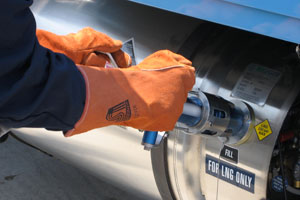House Bill Would Give LNG Tax Parity With Diesel

The bill was introduced March 26 by Republican Reps. Todd Young (Indiana) and Mac Thornberry (Texas) and Democrats John Larson (Connecticut) and Ron Kind (Wisconsin).
“As we see more and more alternative-fuel service stations popping up around my district and the country, it’s important that we ensure inequitable tax rates don’t discourage consumers from adopting alternative-fuel vehicles,” Young said in a statement. “This bill is an easy way to ensure a level playing field for this burgeoning sector of our economy.”
A similar tax equity bill was introduced in the Senate in February by Richard Burr (R-N.C.) and Michael Bennet (D-Colo.). Both bills also include tax equity for propane, often used in warehouse operations.
The current federal tax on LNG is the same as the tax on diesel — 24.3 cents a gallon — although diesel consumers also pay a .1-cent tank cleanup fee.
LNG use on the highway produces 58% of the energy output of diesel, the congressmen said, so their Alternative Fuel Tax Parity Act recognizes the disparity and would set an energy equivalent rate for LNG of 14.1 cents per gallon.
“Leveling the playing field for LNG trucks will enable American businesses to take advantage of clean, affordable, and domestic natural gas and propane,” Larson said.
Thornberry said that tax parity “will encourage more private sector investment in LNG infrastructure and production, and that will have a real, positive effect on our economy.”
Kind called alternative fuels an important part of the comprehensive energy policy that the country needs in order to end dependence on foreign oil.
“The tax code shouldn't pick winners and losers — this legislation would ensure that cleaner-burning fuels like propane and natural gas are treated the same as other energy options,” Kind said.
Compressed natural gas already is taxed on an energy-equivalent basis.
NGVAmerica, a natural-gas advocacy group, praised introduction of the House bill.
“It is a solid signal that we’re getting close to resolving the federal roadblocks that are standing in the way of further accelerating natural gas use in the trucking sector,” NGVAmerica President Matthew Godlewski said in a statement.
American Trucking Associations is supporting the House and Senate LNG bills, said Glen Kedzie, ATA’s counsel for environmental affairs.
“If I need to buy 1.7 gallons of liquefied natural gas to travel the same distance as one gallon of diesel, I’m putting LNG at a disadvantage by taxing it more,” he said.




